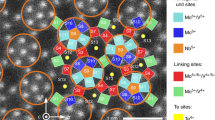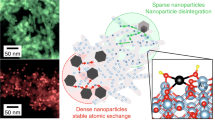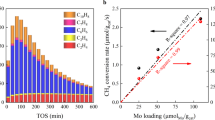Abstract
THE addition of small quantities of promoters to molybdenum oxide catalysts is known to prod striking changes in their activity for hydrocarbon decomposition1. These effects have been related to differences in their capacity for the chemisorption of hydrocarbons at or near the reaction temperature2; but no fundamental reason for these observations was found.
This is a preview of subscription content, access via your institution
Access options
Subscribe to this journal
Receive 51 print issues and online access
$199.00 per year
only $3.90 per issue
Buy this article
- Purchase on Springer Link
- Instant access to full article PDF
Prices may be subject to local taxes which are calculated during checkout
Similar content being viewed by others
References
Griffith, R. H., and Plant, J. H. G., Proc. Roy. Soc., A, 148, 191 (1935). Griffith, R. H., Trans. Farad. Soc., 33, 407 (1937).
Griffith, R. H., and Hill, S. G., Proc. Roy. Soc., A, 148, 194 (1935).
Brunauer, S., Emmett, P. H., and Teller, E., J. Amer. Chem. Soc., 60, 309 (1938).
Author information
Authors and Affiliations
Rights and permissions
About this article
Cite this article
GRIFFITH, R., LINDARS, P. Physical Properties of Promoted Molybdenum Catalysts. Nature 165, 486–487 (1950). https://doi.org/10.1038/165486a0
Issue Date:
DOI: https://doi.org/10.1038/165486a0
This article is cited by
-
Effect of titanium doping on the structure and reducibility of nanoparticle molybdenum dioxide
Journal of Nanoparticle Research (2014)
-
Synthesis and applications of molybdenum (IV) oxide
Journal of Materials Science (2012)
Comments
By submitting a comment you agree to abide by our Terms and Community Guidelines. If you find something abusive or that does not comply with our terms or guidelines please flag it as inappropriate.



